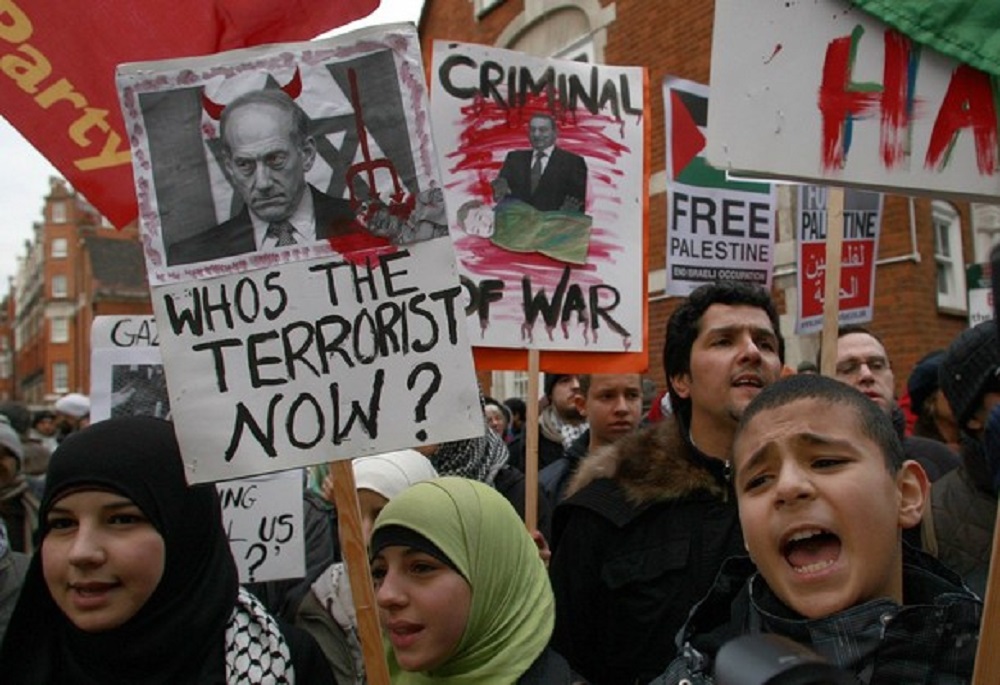In Search of a Conscience
Britain has become the latest battleground in Israel’s fight for existence. Calls for a boycott of Israeli products, the political campaigns demanding divestiture from Israeli companies, the anti-Israel bias of the BBC (despite its own reporter being held captive and forced to make humiliating statements by one of the many armed Palestinian gangs roaming Gaza), and the constant comparisons of Israel to the apartheid regime of South Africa are all indicative of an academic climate in Britain that is either blind to Middle East realities, indifferent to the plight of other threatened Western democracies or apprehensive about its own future amid an increasingly radicalized British Muslim population.
The latest manifestation of this occurred this month when the British University and College Union (UCU), a newly formed British association representing 130,000 college-level academics voted in favor of circulating a request by Palestinian trade unions for a boycott of Israeli academic institutions in protest over Israel’s “forty-year occupation” of Palestinian land. The request is against all the principles of academic freedom that universities espouse especially those relating to the universality of research and learning that must be independent of political pressure.
Without acknowledging that Israel came into possession of these territories as a result of a war forced upon it by its enemies; without acknowledging that Israel has never had a Palestinian partner-in-peace with whom to negotiate the return of these lands; without acknowledging the anti-Semitic diatribes that flow from Palestinian universities, mosques and the Palestinian Authority media (not to mention the culture of “martyrdom” that permeates Palestinian society); and without acknowledging the catastrophic results of Israel’s unilateral withdrawals from Lebanon (2000) and Gaza (2005), the UCU motion condemns Israel for every conceivable perceived injustice to the Palestinians including “the denial of their educational rights….”
Specifically, the UCU motion condemns the complicity of Israeli academia in the occupation even as Israeli university presidents were calling for an easing of travel restrictions for Palestinian students to attend Israeli universities. Had the UCU taken the trouble to look at the historical record, they would have found that Israeli universities have always opened their doors to Arab students and given them opportunities for advancement in fields of study far beyond anything offered in any Arab universities. Even the president of al-Quds University has stated a boycott would be harmful to the Palestinian cause.
The threatened academic boycott would prohibit British academics from attending conferences in Israel, writing for Israeli journals or collaborating on research projects with Israeli academics. But what is most disturbing is the total lack of concern for any other oppressed peoples in the world (and there are plenty). Members of the UCU know that in Chechnya, Russia massacred thousands of Muslims and they know that the Israeli army is far more humane in war than the Russian army has ever proven to be. They know that in Central Europe, specifically in Srebrenica, more Muslims were slaughtered in the space of a single week than were killed in forty years of Israeli occupation. They know that the Syrian regime brutally suppresses its Kurdish minority, murdered thousands of its own citizens in Hama, and jails any intellectual who dares to speak out against the Assad regime. And yet, there is no talk of boycotting Russia or Syria. Only Israel merits such attention. Why not target Russian academics over Chechnya, Chinese lecturers over Tibet, Indian academics over Kashmir or university academics in North Korea, Iran, Saudi Arabia, Libya or the Congo. This absence of balance and the virulence of the UCU’s anti-Israel rhetoric reduces its self-righteous indignation on behalf of Palestinian educational rights to an exercise in hypocrisy, at best or anti-Semitism, at worst.
Furthermore, the UCU’s call for unconditional financial support for Hamas even as Hamas terrorizes Israelis and calls for Israel’s destruction demonstrates that the sympathies of the UCU lie more with terrorists who have no regard for human life than with Israelis who do. The fact that studies at the Sapir Academic College in Sderot have been cancelled because Hamas missiles from Gaza are reining down on the towns and villages of southern Israel or that Hamas does not recognize Israel’s right to exist as a nation-state does not seem to bother these British academics. In fact, these insignificant details did not prevent one boycott initiator from saying that justice in the Palestinian-Israeli conflict is “entirely with the Palestinians.”
The “anti-Zionist” winds blowing through Europe and so strongly influencing British academia these days may have more to do with Londonistan and British fears over the growing Islamic influence in their country than with Israeli policies, but such resolutions nonetheless represent a serious attempt to de-legitimize the State of Israel and strengthen those in the Arab world who argue that the creation of Israel was an historical error that they intend to rectify.
Perhaps the Wall Street Journal summed it up best: “Not every criticism of Israel is anti-Semitic. But the inverse, that criticism of the Jewish state is never anti-Semitic, can’t be true either. To judge Israel by standards different than those applied to any other nation is racist in effect if not intent.” The UCU’s leadership has failed to recognize the shame that it has brought onto itself and in so doing, it has tarnished the reputation of British academia if they approve this boycott. It is bad for Britain, bad for academic freedom, bad for Palestinians and bad for peace.



